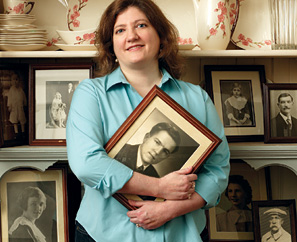Genetic Testing Helps Woman Make Informed Decisions About Health Care
"Have you ever seen a relative go through the cancer process?"
That's the first question San Francisco writer Doreen DeSalvo poses when asked whether she regrets getting tested - and testing positively - for Lynch syndrome.
Lynch syndrome is a hereditary cancer that carries a very high risk of colon cancer and an above-normal risk of endometrial, ovarian and other cancers. Far from regretting her decision, DeSalvo - whose father and brother were stricken with colon cancer in their 40s - now feels she possesses the knowledge to avoid the same fate.
"Because I know this, I'm less likely to end up like my dad," she says. "I always tell myself that I have a piece of information that could save my life."
When DeSalvo's brother was 45, about the age their father and other relatives were when diagnosed with colon cancer, he scheduled an appointment for a colonoscopy. Although he was asymptomatic, the screening revealed cancerous tumors the size of golf balls.
Though living in a different state, he tracked down Peggy Conrad, a genetic counselor at UCSF's Cancer Risk Program, and learned that his family's high incidence of cancer was more than mere coincidence. The center facilitated testing and counseling for DeSalvo's brother near his home, and after the gene was discovered, DeSalvo herself was tested at UCSF. Like her brother, she tested positively for the mutation of the MLH1 gene, the gene that accounts for the majority of detected mutations in families with Lynch syndrome.
Genetic Testing
DeSalvo soon realized she was at the right place. For 10 years, the UCSF Cancer Risk Program, part of the UCSF Comprehensive Cancer Center, has been the largest and most comprehensive genetic testing center for cancer susceptibility in Northern California.
Together with 95 percent of fellow patients who receive genetic counseling in the Cancer Risk Program, DeSalvo is participating in a 20-year follow-up protocol. Through the protocol, the center's counselors provide updated information regarding hereditary cancer, and patients contact the center when there is a change in their family or personal history.
Through the Cancer Risk Program, DeSalvo was also able to participate in two clinical studies funded by the National Cancer Institute. This ongoing relationship with patients can lead to new gene test results, new preventive interventions or involvement in the latest clinical trials.
"I felt like I was getting advice from people who really understand that this isn't normal colon cancer," DeSalvo says. "The doctors and counselors at UCSF are fantastic resources I wouldn't find anywhere else."
The knowledge that DeSalvo gained at UCSF has made her proactive about getting yearly screenings, and has empowered her to make more informed decisions about her overall health care.
"The fact is, learning that you have the mutation isn't a death sentence; it's merely an indication that you need more screening and monitoring," DeSalvo says. "Before, I tended to have my head in the sand, and get a colonoscopy every other year, but no more. I've determined that having a yearly screening is far more convenient than having cancer."
On her father's 52nd birthday, DeSalvo recalls him saying, "I've now lived longer than any other man my mother was related to."
Through surgery, chemotherapy and good fortune, he overcame the odds and beat advanced colon cancer. Thanks to the knowledge and expertise of the UCSF Cancer Risk Program, it's a battle his daughter may never have to fight.
Photo by Mark Estes
Related Links:
UCSF Cancer Risk Program
 |
Doreen DeSalvo |
Related Links